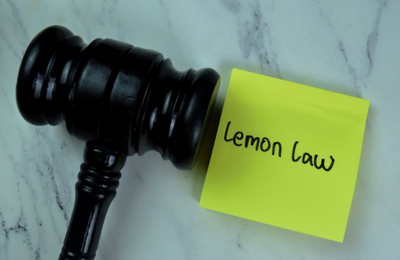
How Do You Know If Your Car Might Be a Lemon? Let me start by saying this: car trouble happens, and not every issue makes your vehicle a “lemon.” Things like a worn brake pad or a dead battery are just normal wear and tear. But when a serious defect keeps coming back, even after multiple repairs, that’s when we may be dealing with a lemon.
Here’s the usual pattern I see: someone buys or leases a car, and soon after, a major issue pops up, maybe the engine stalls, the brakes fail, or the steering locks up. You take it to the shop, they try to fix it, and the same thing happens again. If it’s been in for repairs several times and still isn’t right, or if it’s been in the shop for over 30 days total, you could very well have a valid lemon law claim.
In this article, we shall try to understand what is the lemon law? And we will also see how it affects you and your car purchase.
Does the Lemon Law Apply to Your Situation?
In California, the lemon law is designed to protect people who buy or lease vehicles under a manufacturer’s warranty, whether new or, in some cases, used. That part’s important. If your car was sold with warranty coverage, and the problem began during that period, the law may apply.
This isn’t just for brand-new cars, either. If you bought a certified pre-owned car that’s still under a factory warranty, or even a recent used car with some warranty coverage left, you may still qualify. The law doesn’t just care about age; it cares about timing and how the issue was handled.
What Kinds of Problems Qualify Under the Lemon Law?
Now, not every problem meets the legal standard. The law focuses on defects that seriously affect the vehicle’s use, value, or safety. Some common examples I see include:
Transmission failure that keeps returning
Engine stalling or overheating
Brake systems that don’t respond
Steering that locks or pulls unpredictably
Faulty airbags or seatbelts
Even electrical issues, such as warning lights that won’t turn off or systems that stop working, can qualify if they affect how the car drives or make it unsafe.
How to Start Building a Strong Lemon Law Case
If this sounds familiar, the next step is to document everything. I can’t stress this enough. Save all repair orders, invoices, and notes from the dealership. Write down the dates your car was in the shop, how long it stayed, and what the technicians said. Even text messages or voicemails from the service department can help.
After that, it’s important to notify the manufacturer directly. Many folks think talking to the dealership is enough, but legally, the manufacturer has to be given a fair shot at fixing the issue. If they can’t resolve it after a reasonable number of attempts, that’s where lemon law rights come into play.
How Long Do You Have to Take Action?
In California, you typically have four years to file a lemon law claim, starting from when you first noticed the recurring issue. But waiting is rarely a good idea.
I always advise clients to move sooner rather than later. The longer you wait, the harder it can be to gather records, prove the timeline, or even remember key details. The sooner you reach out, the cleaner and stronger your case tends to be.
What Can You Expect If Your Claim Is Approved?
Here’s What the Law May Entitle You To
If your car does meet the lemon law criteria, here’s what you might receive:
A refund of your payments (down payment, monthly payments, and possibly registration fees)
A replacement vehicle
Reimbursement for repair costs, rental cars, or towing fees
The law is designed to make you whole, to put you back in the position you were in before the problems started.
And No, Legal Help Doesn’t Have to Cost You
One concern people often raise is, “How much will a lawyer cost me?” Here’s the good news: if we win your case, the law requires the manufacturer to cover your attorney’s fees. So you wouldn’t be paying out of pocket for legal help.
In most cases, I start with a free consultation. We go over your documents, the timeline, and your repair history to see if you’ve got a case. There’s no pressure, it’s just a conversation to help you understand your options.
You Don’t Have to Settle for a Bad Vehicle
When people ask what is the lemon law?, they’re usually asking, “Do I have to keep driving a car that keeps letting me down?” And the answer, in many cases, is no.
California’s lemon law is one of the strongest in the country. But like any legal protection, it only helps if you know it exists and take steps to use it. So if your vehicle keeps failing and you’ve done your part to get it fixed, don’t ignore it. Start keeping records. Ask questions. And when you're ready, reach out to someone who can guide you through the next steps.


(0) comments
We welcome your comments
Log In
Post a comment as Guest
Keep it Clean. Please avoid obscene, vulgar, lewd, racist or sexually-oriented language.
PLEASE TURN OFF YOUR CAPS LOCK.
Don't Threaten. Threats of harming another person will not be tolerated.
Be Truthful. Don't knowingly lie about anyone or anything.
Be Nice. No racism, sexism or any sort of -ism that is degrading to another person.
Be Proactive. Use the 'Report' link on each comment to let us know of abusive posts.
Share with Us. We'd love to hear eyewitness accounts, the history behind an article.